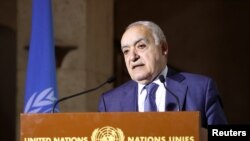A second round of U.N.-brokered talks aimed at achieving a cease-fire between the rival governments in Libya has resumed in Geneva, with the chief U.N. mediator expressing hope of making progress.
The first round ended with no breakthrough earlier this month but, U.N. special envoy Ghassan Salame says much has occurred during the past week-and-a-half, which makes him more hopeful of finding an acceptable solution.
He says separate talks dealing with Libya’s financial and economic situation are moving ahead and political talks are set to begin in Geneva next week. He notes the U.N. Security Council has adopted a resolution supporting calls by world leaders last month during a summit in Berlin for a permanent cease-fire in Libya.
The U.N. mediator acknowledges that the situation on the ground in Libya remains fragile and the temporary truce agreed to by the warring parties is often violated.
"Where new attacks took place even today, in the very port of Tripoli, where incidents take place left and right. While this situation remains on the ground, nobody has so far reneged on the principle of accepting the truce,” he said.
Five military officers representing Prime Minister Fayez al-Sarraj's internationally recognized government, and five officers appointed by rebel military commander Khalifa Haftar, are meeting to negotiate an end to nearly one year of bloody conflict in and around Tripoli.
That conflict, triggered by Haftar’s military assault on the Libyan capital in April, has cost thousands of lives and displaced hundreds of thousands of people. Salame says finding a solution will be a challenge. Nevertheless, he says there are reasons to be hopeful.
“First because the Libyans do want an end to this tragedy they have painted themselves into. But also, that the Berlin conference has produced a follow-up machinery that will push for the implementation of this resolution that basically translates into legal terms the conclusions of the Berlin conference,” he said.
The two delegations are meeting in separate rooms and the U.N. mediator is shuttling between them. Salame says both sides have decided it was better not to hold face-to-face talks just yet. Salame says that does not concern him because he is interested in getting an agreement, not a photo op.





